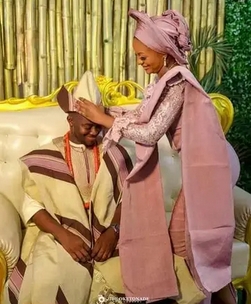
support@yorubalibrary.com
+2348073529208, 07038599574

Yoruba marriage rites are a deeply significant part of Yoruba culture, involving elaborate ceremonies and traditions that bring families together. The groom's family plays a crucial role in these rites, ensuring that customs and protocols are meticulously followed.
Introduction to Yoruba Marriage Rites
Marriage in Yoruba culture is not just a union between two individuals but a joining of two families. The process involves several stages, each with its own set of traditions and responsibilities. The groom's family is actively involved in these stages, from the initial introduction to the wedding ceremony.
The Introduction Ceremony (Mọ̀ Mí n Mo)
1. Initial Meeting
The introduction, or "Mọ̀ Mí n Mo" is the first formal meeting between the families of the bride and groom. The groom's family visits the bride's family to express their interest in the union.
2. Presentation of Gifts
During this meeting, the groom's family presents symbolic gifts to the bride's family. These gifts, which often include fruits, drinks, and kola nuts, signify respect and goodwill.
The Engagement Ceremony (Ìdáná)
1. Seeking Consent
The engagement ceremony, known as "Ìdáná," is a critical part of Yoruba marriage rites. The groom's family formally seeks the bride's family's consent for the marriage.
2. The Bride Price
The groom's family presents the bride price, a traditional requirement that includes money, clothing, jewelry, and other valuable items. This is a gesture of appreciation and respect towards the bride's family.
3. Prayer and Blessings
Elders from both families offer prayers and blessings, wishing the couple a happy and prosperous marriage. The groom's family plays an active role in this spiritual aspect, emphasizing the importance of tradition.
The Wedding Ceremony (Ìgbéyàwó)
1. Arrival of the Groom's Family
On the wedding day, the groom's family arrives at the bride's home with a procession, accompanied by music and dancing. This festive arrival marks the beginning of the wedding celebrations.
2. Exchange of Vows and Rings
During the wedding ceremony, the groom's family witnesses the exchange of vows and rings. They are present to support the groom and to fulfill their cultural responsibilities.
3. Presentation of Gifts to the Bride
The groom's family presents additional gifts to the bride, signifying their acceptance and welcoming of her into their family. These gifts often include clothing, jewelry, and household items.
Post-Wedding Responsibilities
1. Welcoming the Bride
After the wedding, the groom's family plays a key role in welcoming the bride into their home. They ensure that she feels comfortable and accepted in her new family.
2. Support and Guidance
The groom's family provides ongoing support and guidance to the newlyweds, helping them navigate the early stages of marriage. This support is crucial for building a strong and harmonious relationship.
Conclusion
The role of the groom's family in Yoruba marriage rites is multifaceted and deeply rooted in tradition. From the initial introduction to the post-wedding responsibilities, the groom's family is actively involved in ensuring that the marriage is conducted with respect, honor, and cultural integrity. Their participation underscores the communal nature of marriage in Yoruba culture, highlighting the importance of family and tradition in this significant life event.

Learn about the Yoruba concept of Ìwà Pẹ̀lẹ́ (good…

Learn special praises for Divine Being and Creator…